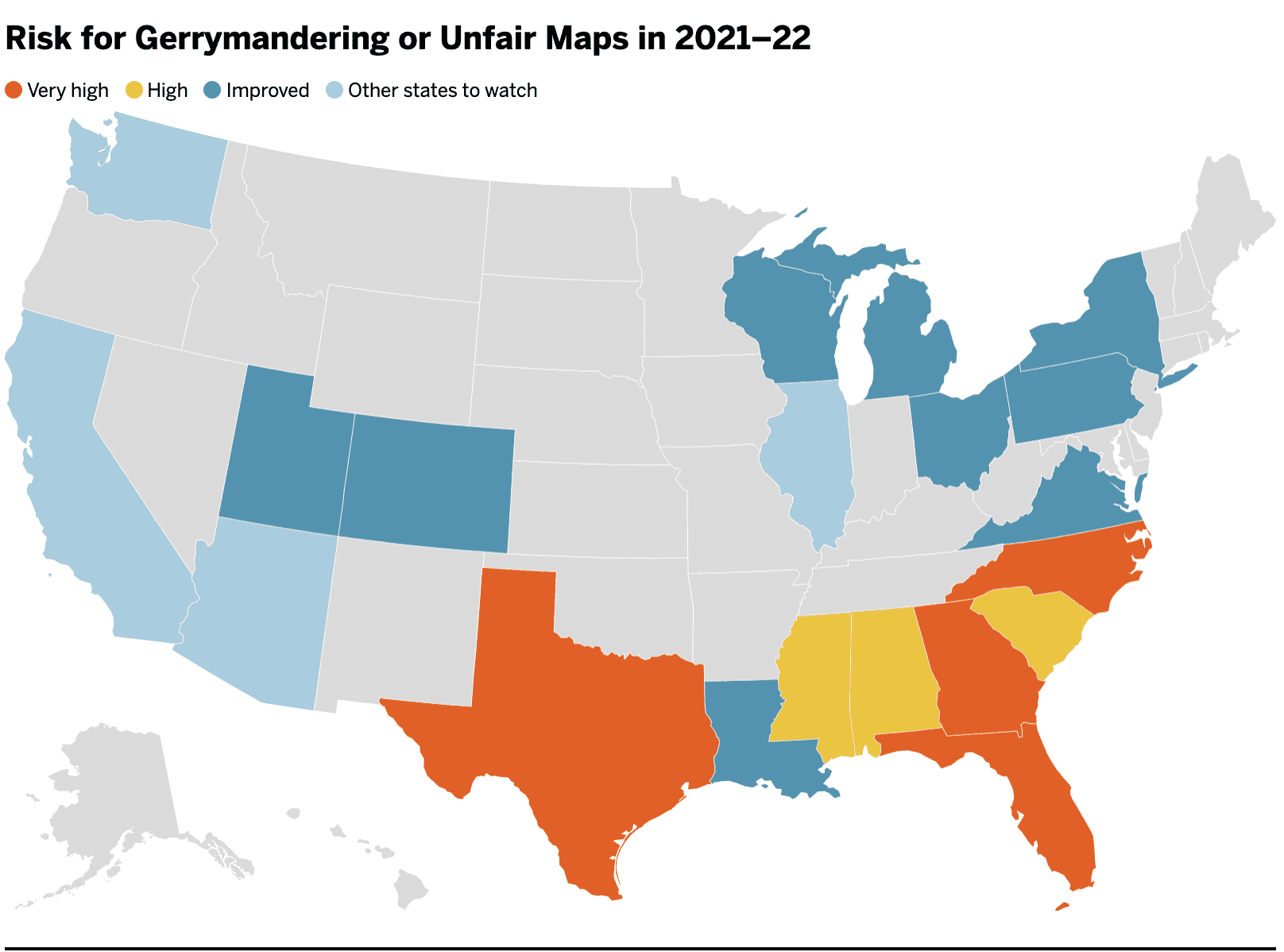GOP may take back House in 2022 by redistricting 4 states, here's how

Ever since Donald Trump lost the 2020 presidential elections, the Republican Party has been on the warpath against the election system. In several states, they have introduced bills to make it harder to vote, and in others like Arizona, they are still trying to convince the public that Trump won. A new report indicates another way for the GOP to win elections without convincing voters, and it involves the controversial system of gerrymandering.
With the 2022 mid-terms close at hand, voting rights have become a key issue. In New York, Governor Andrew Cuomo restored felons' right to vote in May 2021. It's a rare move, as mostly GOP-controlled states have rushed to enact limits. In Texas, Democratic lawmakers fled Austin in a bid to stall the state's controversial voting bill, enraging Governor Greg Abbott. Earlier this year, the voting rights bill in Georgia drew widespread condemnation, even from major businesses like Delta.
RELATED ARTICLES
Are the Democrats really in favor of banning voter ID laws?
Republicans have faced significant opposition when it comes to enacting their voting rights bill, which could make it hard for mostly Democratic voters to cast their ballot. As the debate about voting engulfs the country, a new report from TargetSmart highlights another tactic the GOP can use and has so far not begun active efforts to do so. That is by gerrymandering or redrawing congressional districts. TargetSmart believes the GOP would need to redraw only four states in order to win back the House.

How can the GOP win back the House?
Gerrymandering is the process of manipulating the boundaries of an electoral constituency so as to favor a single party. For years, it's been common practice in the US, as both Democratic and Republican governments have tried to hold on to their gains. As statistics show, it has gone on to unfairly advantage the GOP. In 2017, the Associated Press noted that "Republicans won as many as 22 additional US House seats over what would have been expected," thanks to partisan gerrymandering.
The Brennen Centre believes that the party can do it again, simply by redrawing the maps in Georgia, Florida, North Carolina, and Texas alone. While it is possible in other states, the center believes these four states are "at the highest risk of extreme gerrymandering". The GOP will be able to redraw 187 congressional districts, compared to 75 for Democrats ahead of 2022, the center noted. That's a significant advantage. Data scientist David Shor found that if everyone voted the same way as in 2020, Republicans would take back the House simply based on their control of the redistricting process.
Through gerrymandering, the GOP can put a halt to demographic changes that would traditionally benefit Democrats. Nearly 75 per cent of the growth in Florida, Georgia, North Carolina, and Texas comes from communities of color, but by gerrymandering, the GOP can ensure that those changes don't reflect on those elected. There are two ways to do this:
1) Fracking: dividing a traditionally Democratic district to weaken their voting power
2) Packing: packing all the Democratic voters into a single district, limiting the number of seats they can gain
It's an advantage that the GOP isn't shy about using. At the Faith and Freedom conference in June, Rep Ronny Jackson (R-TX) said, "We have redistricting coming up, and the Republicans control most of that process in most of the states around the country. That alone should get us the majority back." By redistricting the four states, the GOP could pick up anywhere between six and 13 seats in the House, enough to give them a majority. Democrats are fully aware of that, which is why they are attempting to fight back.

For The People Act matters
Gerrymandering, under state laws, can be done by the party in power. That means the GOP has a significant advantage as they control the legislature in most states. In some states, redistricting is done by an independent commission, but that's a rarity. According to Ballotpedia, the GOP has a trifecta (control of state House, Senate, and Governorship) in 23 states, compared to the 15 by Democrats.
In a bid to break their dominance over redistricting, the Democrats have introduced HR 1 or the For The People Act. Amongst other things, the bill bans partisan gerrymandering and state-level voting restrictions, which would make it harder for the GOP to limit voting rights. So naturally, the party filibustered the bill in the Senate. TargetSmart CEO Tom Bonier told Mother Jones, "Absent the passage of HR1, the GOP is poised to gerrymander their way to a House majority."

If HR 1 is passed, it would abolish partisan gerrymandering by state governments in favor of independent commissions. It also invalidates existing maps that have the intent or effect of “unduly favoring or disfavoring” one political party over another. This is an issue that has to be fixed in Congress because as the Supreme Court ruled in 2019, federal courts cannot review partisan gerrymandering. There is however some hope for Democrats. A stripped-down version of HR1 has been proposed by Sen Joe Manchin. It does get rid of some of the more controversial measures but keeps in the ban on partisan gerrymandering.
The bill is expected to be introduced in the Senate in the coming days and may have a better shot of being approved. As Mother Jones noted, "That legislation will only make a difference on redistricting if enacted before the new maps take effect — giving Democrats a matter of weeks to act." The urgency is greater when taking into account the fact that it is people of color that are likely to be most impacted. TargetSmart found that at least six Democratic representatives of color could lose their seats if the maps in Georgia, Florida, North Carolina, and Texas are redrawn.










